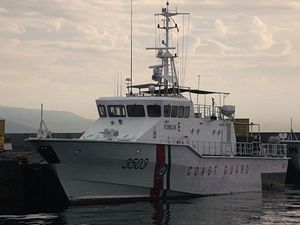On Monday, Philippine Coast Guard (PCG) spokesman Lt. Cdr. Armando Balilo said that the Philippine and Chinese coast guards would look to boost their ties with visits and exercises beginning later this year. Despite the sensationalist headlined that followed Balilo’s remarks, his statement is just the latest sign that the relationship between the two coast guards is beginning to warm under President Rodrigo Duterte in spite of the lingering South China Sea dispute.
As I have noted before, the Philippines and China have been eying closer coast guard cooperation as among the key items designed to boost the relationship since Philippine President Rodrigo Duterte took office last June. Indeed, one of the key agreements concluded during Duterte’s closely-watched maiden voyage to China in October last year was a memorandum of understanding on coast guard cooperation (See: “The Limits of Duterte’s US-China Rebalance”).
Though the language on what that cooperation would look like was rather vague, both sides did follow through to outline some specifics, beginning with the first organizational meeting between the two coast guards to discuss the formation of a Joint Coast Guard Committee on Maritime Cooperation (JCGC) held in Manila in December. They also discussed a proposed hotline between their coast guards, which would constitute an important albeit limited confidence-building measure (See: “Beware the Illusions of China-ASEAN South China Sea Breakthroughs”).
The second organizational meeting and the inaugural meeting of the JCGC was held from February 20 to 22 in Subic Bay. At the time, the JCGC adopted the implementing guidelines of the MOU and the terms of reference of the working groups to assist in its operation, which includes combating drug trafficking and other transnational crimes, search and rescue, environmental protection, and emergency response. They also agreed on a hotline mechanism, though few specifics were publicly provided.
At the time, the official press release following the meeting had indicated that “bilateral exchange activities,” defined to include high-level visits, maritime operations and related exercises, vessel visits, and capacity-building would be conducted to further enhance collaboration.
Balilo’s comments on Monday, which were initially given exclusively to CNN Philippines, were therefore merely a confirmation that both sides will be pursuing these bilateral exchange activities. Those activities can be expected to be slow at first given how new the coast guard relationship is. In his remarks, Balilo gave the example of a simple interaction that would take place in August or September where a ship from the Chinese Coast Guard headquarters in Guangdong would be coming to the Philippines, and Manila would send two ships on the way back to the Chinese vessels’ home port. Along the way, he said there will likely be exercises focuses on areas like search and rescue or law enforcement.
Apart from this, Balilo also previewed other areas of cooperation that are set to take off. Exchanges would kick off in June when the PCG will send 20 personnel to China to learn about law enforcement. China and the Philippines have also already worked out arrangements on joint search and rescue operations and are laying the groundwork for mutual agreement on the handling of illegal drugs and piracy in the high seas (See: “Can China Patrols Help Duterte in the Philippines’ Terror War?”).
Of course, it is still early days for Sino-Philippine coast guard cooperation. And it is important to remember that closer collaboration in this field continues to exist alongside lingering tensions on the South China Sea disputes, with the two countries recently trading barbs on the presence of Chinese ships in Benham Rise. Yet at least for the time being, the Duterte administration appears committed to trying to pursue better ties with Beijing in spite of these irritants.































